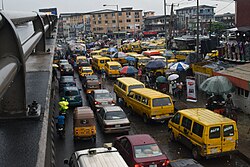Ojuelegba
Ojuelegba | |
|---|---|
 | |
| Coordinates: 6°30′33.372″N 3°22′0.66″E / 6.50927000°N 3.3668500°E | |
| Country | |
| State | Lagos State |
| LGA(s) | Surulere |
| Time zone | UTC+1 (WAT) |
| Area code | 101283 |

Ojuelegba is a suburb in Surulere local government area of Lagos State.[1] It's known for its traffic congestion and nightlife.[2][3]
Structural composition
[edit]Ojuelegba is one of the key transport modes of Lagos, connecting the city's Mainland with the Island. It also serves as a connecting point for people who commute the three surrounding districts of Yaba, Mushin and Surulere.[4]
Life in Ojuelegba has been depicted in several musical works, including Fela's 1975 Confusion album, Wizkid's "Ojuelegba" single and Oritse Femi's "Double Wahala" single.[5]
Nightlife
[edit]From the 1970s through the early 1990s, Ojuelebga was known for its high crime rates and its boisterous night life, connecting revelers to Fela Kuti's Moshalashi Shrine on Agege Motor Road and to the red light district starting in Ayilara street through to parts of Clegg Street.[6] Efforts were made in the 1990s to curb crime and prostitution, converting brothels and nightclubs to residential buildings, mosques, and churches. While armed robberies have remained rare, the area has returned to being a hotspot for prostitution.[2]
Mini Gallery
[edit]See also
[edit]- Confusion (album), an album with lyrics that discuss the neighborhood
- "Ojuelegba" (Wizkid song), a song named after the neighborhood
References
[edit]- ^ "Gbajabiamila condoles families of victims of Ojuelegba trailer crash". Daily Post Nigeria. 3 September 2015. Retrieved 8 September 2015.
- ^ a b Omiko Awa; Charles Okolo (19 July 2015). "Ojuelegba: Return Of A City's Groove Centre". The Guardian Nigeria. Archived from the original on 12 August 2015. Retrieved 8 September 2015.
{{cite news}}: CS1 maint: multiple names: authors list (link) - ^ Fairfax, Frank Thurmond (1993). Fela, the Afrobeat King: Popular Music and Cultural Revitalization in West Africa. University of Michigan. p. 251. OCLC 713128918.
For Ojuelegba, moto dey come from south / Moto dey come from north / Moto dey come from east / Moto dey come from west / And policeman no dey for centre / Na confusion be that-i o / He go say he pafuka o.
- ^ "Ojuelegba: the Sacred Profanities of a West African Crossroad" (PDF). Retrieved 8 September 2015.
- ^ Yinka Olatunbosun (19 July 2015). "Wizkid's Ojuelegba Evolves". Thisday. Retrieved 8 September 2015.
- ^ "AYILARA STREET, EX-LAGOS DRUG AND PROSTITUTION HAVEN NOW MADE CLEAN, HOLY". The Nigerian Voice. The Nigerian Voice. 5 June 2010. Retrieved 23 February 2017.












